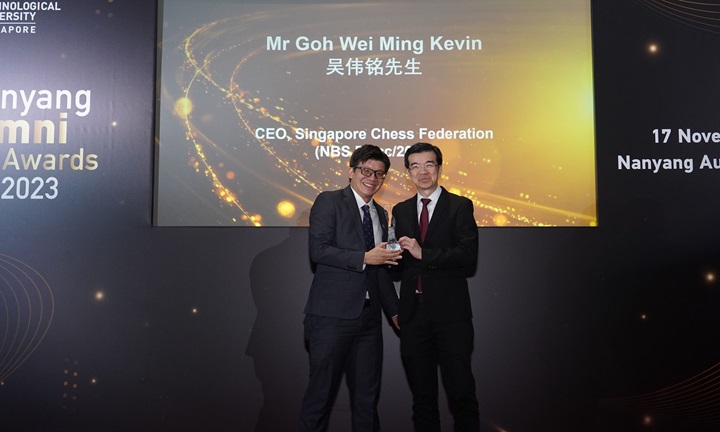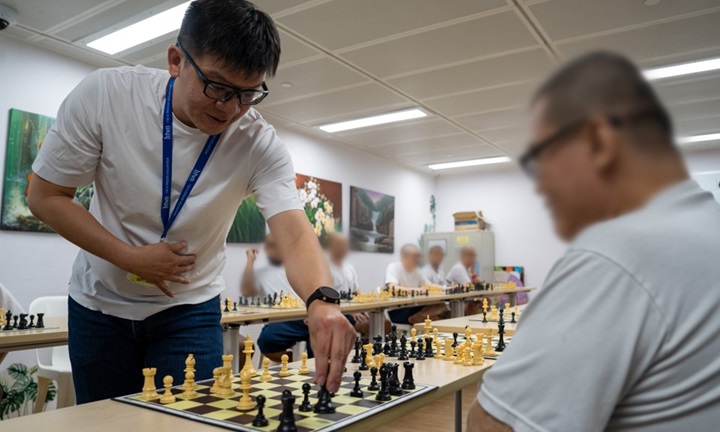Shining light on a chequered path
At Singapore Chess Federation, Kevin Goh (NBS/2007) is going all in to raise the next generation of chess champions in Singapore, and is sharing the game and its life lessons with inmates.
Text: Lester Hio
Kevin Goh believes chess is one of the most gruelling physical sports around. He would know, having competed at the top level over the last two decades and achieving the title of Grandmaster in 2020, placing him in elite company among only 1,700 Grandmasters in the world. In doing so, the 40-year-old became Singapore’s first chess Grandmaster in two decades and the nation’s fourth.

The recipient of this year’s Nanyang Outstanding Young Alumni Award is gearing up to raise the next generation of chess Grandmasters in Singapore, giving up a comfortable corporate job to pursue this dream for Team Singapore.
“The key vision is that I hope to significantly increase the awareness of chess as a game that has loads of social and educational benefits, and as a truly competitive sport,” says Kevin.
The Nanyang Business School alumnus, who graduated with a Bachelor of Accountancy in 2007, started playing in his primary school’s chess club and eventually became Chief Executive Officer of the Singapore Chess Federation (SCF) at the end of 2022.
When he attained his Grandmaster rank, Kevin was juggling a full-time high-powered job as Chief Financial Officer of cance diagnostics company Lucence, where he played a key role in the company’s growt and helped to raise US$20 million in its Series A fundraising. Prior to that, Kevin began his career at KPMG Singapore, where he was one of the first two athletes enrolled in the company’s programme for elite athletes.
Getting to that elite level wasn’t all about sitting down staring at the chessboard. As part of his training, Kevin runs long distance races from 10km to half marathons to build the physical stamina needed for chess competitions, where games can stretch to six hours.
“I know a lot of people might laugh, but I believe that chess is a gruelling physical sport, and that the FIDE Chess World Cup is the most physically demanding sporting event in the world,” he says.
Any chess player worth their salt knows the value of sacrifice – both in and outside the game – and Kevin’s pursuit of chess mastery certainly required that. The lifelong chess enthusiast, who picked the game up when he was 10 years old, put chess ahead of his career at multiple junctures. “I took a year off work in 2011 to pursue a professional chess-playing lifestyle – something which could have been detrimental to my career path at KPMG. This was a risk I was willing to take, given that a person's average working life is around 40 years, and I was confident that sacrificing one year would not be too damaging in the long run,” says Kevin.
 Photo: Singapore Prison Services
Photo: Singapore Prison Services
As he took up the top role in the SCF, however, he knew he would have to go all in to meet his goals of raising awareness of chess here.
“I felt that I could not quite manage to handle both roles well and I made a difficult sacrifice in giving up what is otherwise an exciting and meaningful career,” said Kevin, who took a pay cut in making the switch. “I basically decided that this was the right time to focus on growing chess in Singapore, given that chess is a game that I love and that I have many ideas on its growth here.”
Growing chess’ exposure here goes beyond training today’s top young players. In August this year, the SCF initiated “Chess for Freedom”, which uses chess as a rehabilitation tool for inmates. The programme exceeded Kevin’s expectations, with over 30 inmates signing up and even asking to double the number of weekly sessions. The programme now has 15 volunteers, and Kevin welcomes more volunteers to join him, as well as any form of publicity and collaborations.
“I hope to achieve two things – one which is to share my love of the game with the inmates, and use chess to bring across certain applicable life skills,” says Kevin. “For example, I often say that in chess you are accountable for your own moves. I also emphasised the need to learn and train together as a team, and it was pleasant to know that the inmates have been studying the homework that I give each week, together.”
Related stories:
- Hallmarks of excellence
- A flair for fixing problems
- Trading suits for smiles
- A global citizen
- Making masterpieces from moments
This article first appeared in issue 4 of U, the NTU alumni magazine.







